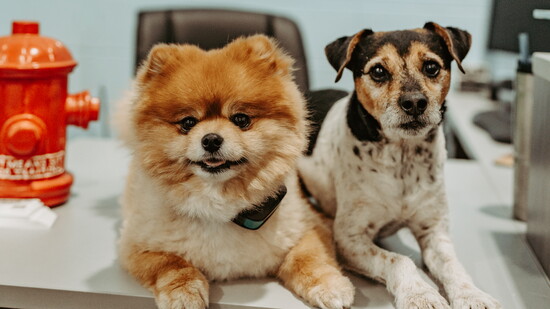There is nothing like the excitement of welcoming a new puppy to your home. Though I’ve done it many times and raised eight litters of Leonbergers in my home, each experience is unique in the best way. Like any other healthy relationship, developing a bond with your new puppy is something that requires cultivation—investment, if you will. In my dog-centric world, I get to see the excitement of new owners and also where frustrations can fester. With some basic tips to keep in mind, you can make your time with your new fluff ball as rewarding as possible.
Most people immediately think of the usual things they must do when they get a new pup: go to puppy training classes and get age-appropriate vaccinations. Yes, definitely, but there are some additional easy ways to increase the odds of a fun, nourishing relationship with your very soon-to-be adult dog.
Invest your time & accumulate understanding
I frequently remind attendees of our puppy classes that they are not off the hook with their puppy’s socialization and training just by attending a one-hour class each week. Raising a puppy is a seven-day-per-week job. There is nothing more important you can give to your puppy than dedicated time. That kind of time doesn’t come from keeping half an eye on your pup while scrolling Instagram. Instead, think active engagement. Think eye contact and interaction. While you’re spending time with your puppy, really listen. Watch and observe. Your puppy has so much to tell you about her personality, her likes and dislikes. What gives her joy, what she needs from you, where her confidence might still need to grow. So, how can you know if the time you’re spending is quality? It should accomplish one of two goals, maybe both simultaneously. It should be teaching your puppy some skill or expectation that he needs to function successfully in your family, and/or it will meet your puppy’s need for mental or physical exertion.
Three easy ways to spend some quality time with your pup:
Make regular socialization visits to new places, not the same places every week. Shoot for at least 3 times per week. The trips don’t need to be hour long marathons. A quick jaunt to a new pet-friendly store, neighbor’s house, or park will do just fine. The side benefit of these excursions is a tuckered-out puppy.
Play with your puppy. Sounds easy enough… but really pay attention to the game that your puppy wants to play. Many times, humans have ideas about what they want to do. Maybe your Labrador puppy doesn’t want to retrieve a ball, maybe she wants to play tug or chase. Spend some time letting the puppy guide the play. I promise this won’t cause a dominance challenge, but it will let your
puppy know that you’re genuinely interested in making play fun for them.
Let the puppy guide the daily walk. If he doesn’t want to go past three houses down, that’s fine. If he wants to sniff a very interesting tree for five minutes, let him sniff until he’s finished. Let him pick to turn left or right at a curve in the road.
We ask quite a bit of our puppies without really thinking too much about it. It’s easy to overlook that coming away from their mom and littermates is a tremendous change for these little guys. In return, the time and effort we dedicate to them is nothing we can put a price tag on, but if we treat them right, we’ll get the reward of a relationship unlike any other. I’d say that’s an exponential return on investment.
Sit Means Sit offers open-enrollment puppy classes that begin most weeks, depending on availability. Classes fill up quickly, often booking several weeks in advance, with a maximum of 10 puppies per session.
Class schedule:
- Monday & Wednesday evenings – 7:00 PM
- Wednesday afternoons – 2:00 PM
- Saturday mornings – 9:00 AM
Secure your spot early to ensure availability!
